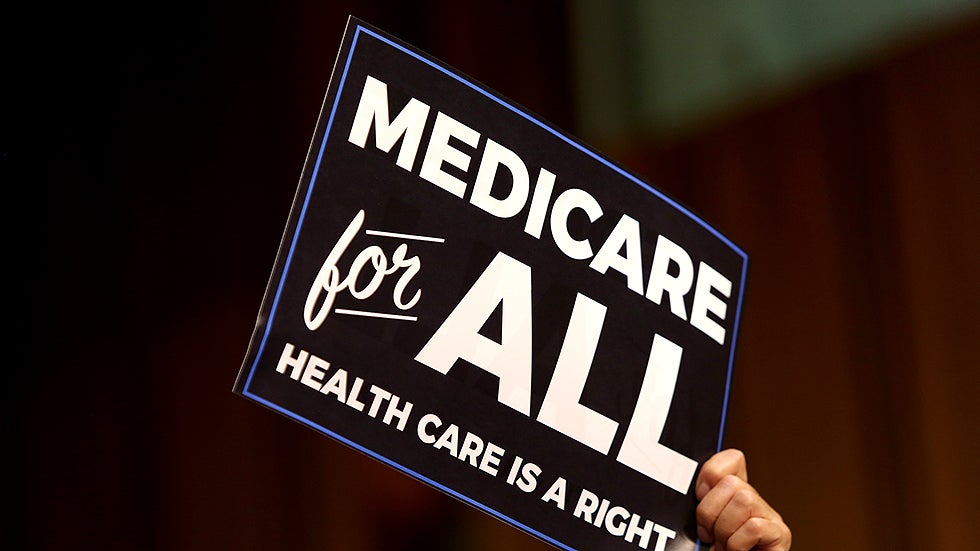

Home / Blog / Medicare Insurance / Medicare for All

27.5 million Americans don’t have health care.
Why?
Well, many simply can’t afford it.
The question then becomes: should America embrace “Medicare for All” so that everyone has access to healthcare?
And if so, what would universal healthcare look like?
Free Medicare Insurance Comparison - Save up to 30%
No junk mail. No spam calls. Free quotes.
No Signup required
It’s important to note that Medicare for All isn’t just one bill, there are actually several different proposals in circulation. These range from universal healthcare for every American to Medicare for all who want it, which advocates expanding ACA plans to include a public component.
According to a Commonwealth Fund report on health care systems in industrialized countries, the US healthcare system is expensive and does not offer the same care or quality that other countries experience. Thus, America finds itself on the brink of healthcare system reform.
An overhaul of the Medicare system requires America’s current multi-payer system (i.e., government, employers, and private insurers) to convert to a single-payer system (e.g., your taxes pay for healthcare).
The current Medicare program would not cease to exist, it would instead pivot to provide Americans with alternative services like long-term care.
This depends on which Medicare for All plan you’re looking at.
Under Medicare for All, there are no coinsurance, co-pays, or deductibles for items covered under the plan. Additional healthcare costs not covered by Medicare for All are subject to out-of-pocket expenses.
Other plans advocate removing out-of-pocket expenses for low-income individuals and families. That would mean Americans above the low-income threshold would pay out-of-pocket expenses of $3,500 for individuals while families would be capped at $5,000 a year.
Free Medicare Insurance Comparison - Save up to 30%
No junk mail. No spam calls. Free quotes.
No Signup required
Medicare for All would allow you to retain your family doctor as the new healthcare system builds on the pre-existing Medicare structure. However, doctors may elect not to participate in the new Medicare for All program.
In addition, most bills suggest patients may also opt to privately pay for their healthcare.
Perhaps the most significant divide between the two healthcare reforms is whether private insurance companies will continue to operate within the new Medicare system. On the universal healthcare side (Medicare for All), private insurers can’t sell plans that duplicate healthcare received under Medicare for All.
However, Medicare for all who want it allows insurance companies to operate as the competition; in theory, this should drive private Medicare costs down.
Medicare for All will be ACA-compliant, which means even if you have a pre-existing condition like cancer, asthma, or diabetes, you’re still eligible for coverage.
Unfortunately, there is no way of knowing if this is the best solution for America. Introducing a new healthcare system will come with growing pains like tax increases. However, if paying more for taxes gets healthcare coverage to everyone, is it worth overhauling the current Medicare system?
Free Medicare Insurance Comparison - Save up to 30%
No junk mail. No spam calls. Free quotes.
No Signup required
What would the transition look like if America were to implement Medicare for All? Ultimately, it depends on which Medicare policy is adopted. Experts in the field indicate that a universal healthcare model, which removes private insurers, would happen in waves, likely by age.
Medicare for All is a widely debated topic, so it is unlikely that it will happen anytime soon. The first big feat Medicare for All would have to overcome is passing in a split US Congress. The next obstacle would be the public division on support for Medicare for All.
Whether it’s Medicare for All or something else, Americans can very likely expect healthcare system reform in the coming years.
Hollay Ghadery Hollay Ghadery is a writer and editor who is passionate about financial literacy as a means to personal fulfillment. Hollay has over 18 years of experience creating content about a range of topics related to personal finance, including insurance, investing, banking, and credit cards. When Hollay isn't writing, she's spending time with her four children, two dogs, and three goats.